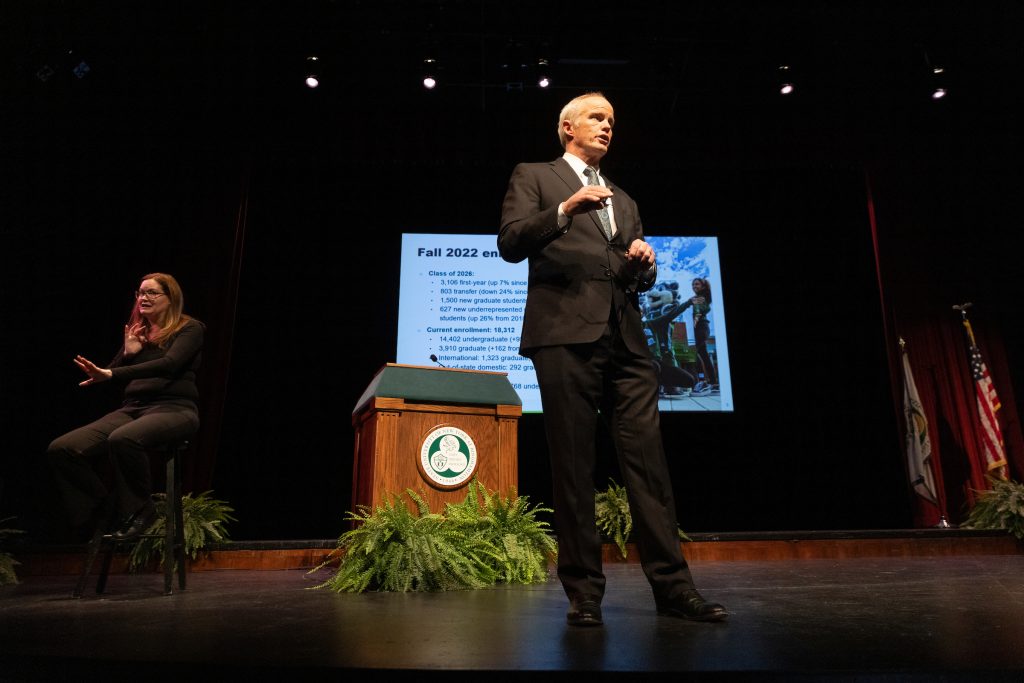Binghamton University President Harvey Stenger gave his annual State of the University address on Tuesday.
The theme of Stenger’s speech was “happy.” Highlights included an announcement of the largest scholarship gift in BU history, an expansion of the Binghamton Advantage Program (BAP), the usage of federal and state funding for increased hiring, progress on existing and conceived infrastructure projects and the impact of the new SUNY chancellor, John B. King Jr.
The new scholarships, funded by an anonymous family and totaling $37.5 million, will be divided into a $25 million endowment for undergraduate students and a $12.5 million endowment for graduate students in the arts. Stenger hailed it as “a good day for [BU].” The undergraduate scholarship will be implemented gradually, with 25 incoming freshmen receiving funds until “the program reaches a steady state of 100 scholarships awarded per year,” according to the press release.
Of the 25 students, 20 will receive $10,000 per year for four years, while five will receive approximately $30,000 per year for four years, both requiring the maintenance of a minimum GPA. The graduate scholarship will cover the full tuition for 15 incoming graduate students “with exceptional skills in the performing, writing and visual arts until the program reaches a steady state of 30 scholarships per year.”
Stenger also provided details about the gradual integration with SUNY Broome Community College (BCC), emphasizing that it will not be a merger, but rather an expansion of the BAP program that currently allows students to live at BU and attend classes at BCC.
“[BAP transfer students] are the highest graduating cohort of students on campus,” Stenger said. “What if we were to admit students into a BAP 2.0, where instead of living here, they live [at BCC], take their courses there and enjoy all their student activities [at BU].”
Stenger stressed the impact federal and state funding would have on University operations. BU will receive $6.5 million from SUNY to hire faculty to grow external research, which will add to the 55 tenure-track faculty that joined the campus community last fall. In addition, BU will receive $63.7 million from the federal government and $50 million from New York State to establish a national hub for lithium-ion battery manufacturing, development and production in Endicott, NY. Distinguished Chemistry Professor M. Stanley Whittingham, a Nobel Prize winner, will lead the project.
An update on BU’s “EXCELERATE: Moving at the Speed of Binghamton” campaign, which launched in April 2022 with a goal of raising $220 million, was also provided. Priorities of the initiative include greater investing in scholarships to “make the exceptional accessible,” expanding faculty research and programs with national implications and “ensuring an exceptional education” through internships and hands-on learning. The campaign has raised $160 million in received or committed funds, not including the new donation by the anonymous family.
Stenger continued by describing the progress of existing infrastructure construction, as well as plans for future projects, including new facilities and the expansion of current buildings. This includes the completion of the third-floor renovation of the Glenn G. Bartle Library by fall 2024, a remodeled Old Rafuse Hall by August 2023, the new welcome center by the main entrance finished by spring 2024 and a new lecture hall currently in design.
Stenger reflected on the future of BU under new SUNY Chancellor John B. King Jr.
“Somebody with the government and political skills [is] the leader that SUNY needs right now,” Stenger said. “[King] is working really hard on the most positive budget proposal that came out of the Governor’s State of the State address. It is a one-dollar match for every two dollars of endowment gift that we get.”
The event ended with recognition of recent electoral achievements by BU alumni. They include Hakeem Jeffries, ‘92, elected to minority leader of the US House of Representatives, Lea Webb, ‘04, elected to the State Senate and Donna Lupardo, ‘90, reelected to the State Assembly.
Christopher Wen ‘07, a third-year graduate student pursuing dual master’s degrees in sustainable communities and public administration, provided his thoughts about the announced initiatives to expand scholarship access.
“These scholarships can make a world of difference in the lives of students and their families,” Wen said. “This is fantastic news. I’m glad more students will get the opportunity to pursue their passions through higher education.”
Earl Tampus, an undeclared freshman, said he felt larger scholarship endowments would have an impact on prospective students.
“College is expensive, no matter your income level,” Tampus said. “I think that it will help people from lower-income families believe that institutions can help them attend school.”



